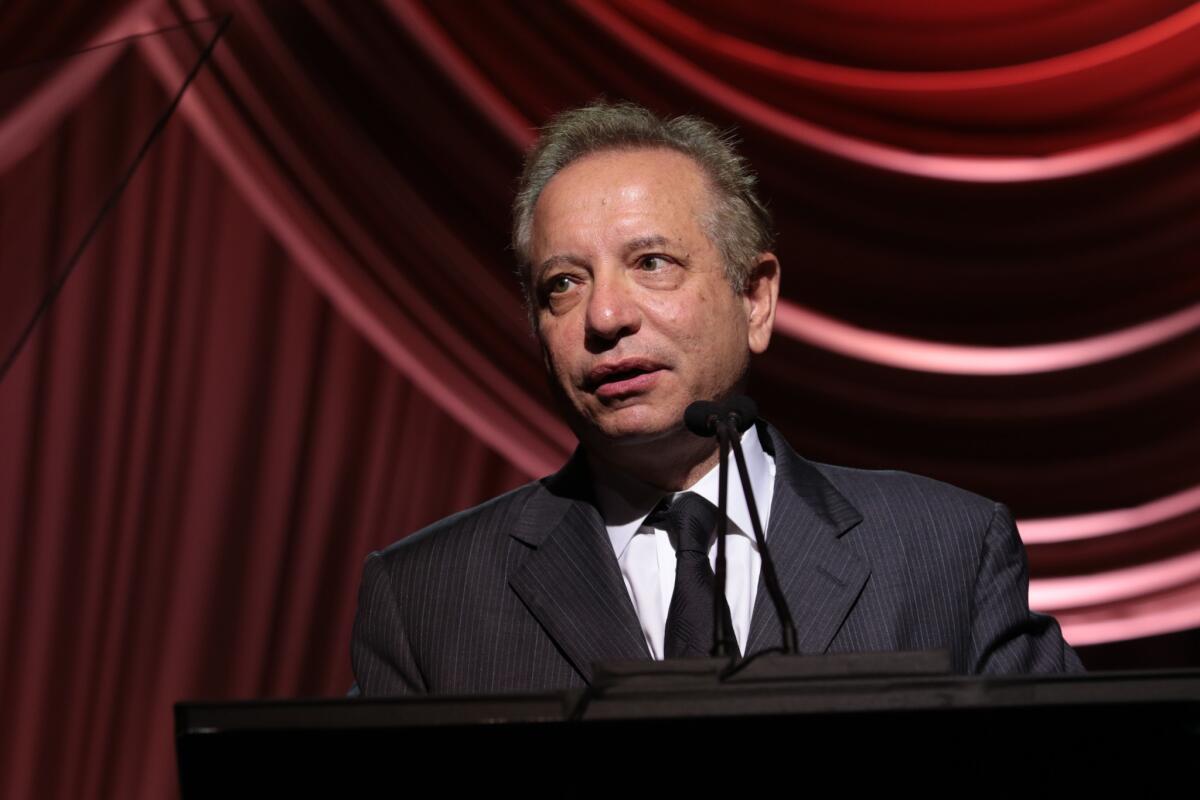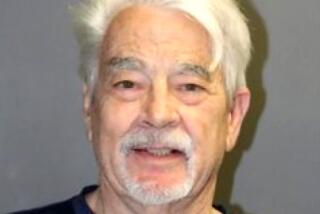USC had many warnings about medical school dean’s behavior but took little action

For years, the troubling reports circulated among the faculty of USC’s Keck School of Medicine: Their dean had a drinking problem.
One colleague told of witnessing a boozy Dr. Carmen Puliafito reeling and shouting at a university dinner. Another said Puliafito appeared drunk at an off-campus gathering as he spilled into his car and drove away.
Then there was a Keck medical conference, a researcher who attended recalled, in which the dean seemed inebriated when he fell asleep in his chair.
Complaints of Puliafito’s drinking began to reach USC administrators more than five years ago. Then in 2016, and again last March, the university received information that Puliafito was in a hotel room with a young woman who suffered a drug overdose.
But USC allowed Puliafito to remain at the Keck school, where the renowned eye surgeon continued to treat patients. The university did not report him to the California Medical Board during that period, a USC source confirmed. The board routinely suspends physicians from patient care if they are suspected of being impaired by alcohol or drugs.
The medical profession’s principles of care state that supervisors and others in hospitals and clinics have a responsibility to act promptly to remove from practice doctors showing any signs of alcohol or drug abuse. That did not happen with Puliafito.
The university did not suspend Puliafito’s medical privileges until after publication of a Times investigation in July that detailed his second life as an associate of abusers and dealers of hard drugs with whom he regularly used methamphetamine and other drugs. The newspaper’s investigation triggered a medical board inquiry that resulted in formal allegations last month that Puliafito, for 21 months, smoked meth “within hours” of seeing patients and abused that drug on a near-daily basis at the Keck campus and elsewhere.
Dr. Nancy Jecker, a professor in the University of Washington School of Medicine’s Department of Bioethics and Humanities, said the complaints of excessive drinking “were a sufficient basis to suspend Dr. Puliafito from practice while these reports were competently investigated.”
“The ethical choice could not be clearer: serve the interests of the institution or the welfare of vulnerable patients,” she said.
USC has not provided a full account of how it handled the various allegations about Puliafito. University President C.L. Max Nikias said in a letter to the USC community this summer that the school referred Puliafito to Keck’s Hospital Medical Staff — a peer review panel — last March, after The Times inquired about the former dean’s presence at the drug overdose at a Pasadena hotel. The panel found “no existing patient care complaints and no known clinical issues” with Puliafito, Nikias wrote.
The school did not review his clinical privileges when he stepped down last year because there was no evidence of “illegal or illicit activities,” Nikias said in the letter.
Even some within the medical school leadership question why more wasn’t done.
Two days after The Times story ran, scores of medical school students packed a campus forum to get answers from Dr. Rohit Varma, who succeeded Puliafito as dean of the Keck school. Varma said USC administrators knew nothing of Puliafito’s use of drugs until The Times published its investigation. But Varma acknowledged that the school was aware of Puliafito’s problems with alcohol.
“It raises an issue of why more wasn’t done at that time,” Varma told the students, adding that he personally had seen Puliafito “in that alcohol abuse haze,” but not when he was treating patients.
Varma told the students that Puliafito had sought and received treatment for alcohol abuse.
In a recent statement, USC said Varma “regrettably misspoke” when he related that Puliafito had received treatment. “He intended to say Puliafito had been counseled on his professional behavior,” the statement said. “We have no record of Puliafito receiving treatment for alcohol issues.”
Experts said any USC leaders who knew about Puliafio’s drinking had a duty to intervene, regardless of whether he was in treatment for alcoholism.
Varma and other USC administrators, including Nikias, declined to be interviewed for this story. A university spokesman said in a statement that “there have been no documented patient complaints, malpractice reports or other issues with patient care related to Carmen Puliafito.”
Varma stepped down as dean last month as The Times prepared to report that the university had concluded in 2003 that he had sexually harassed and then retaliated against a female fellow he supervised.
The medical board has suspended Puliafito’s license to practice pending the panel’s decision on the findings of its investigation. If the board decides to punish Puliafito, it could revoke his license or reactivate it with certain restrictions, such as a requirement that he undergo drug and alcohol testing. The inquiry has been conducted by the investigation division of the state Consumer Affairs Department, which has the option of referring its findings to local prosecutors for criminal charges.
The state agency responsible for regulating hospitals, the California Department of Public Health, said it is not investigating Keck. The department said in an email that it “has not received any complaints or facility reported incidents involving Dr. Puliafito.”
The American Medical Assn. and the Accreditation Council for Graduate Medical Education advise physicians and their supervisors to promptly remove from practice doctors who could be impaired by alcohol or drug abuse.
The council accredits Keck Hospital and other institutions as sites where medical residents can train. Puliafito headed the medical school from 2007 until last year and remained in practice until July.
A publication of the accreditation council states that “impaired physicians must be recognized and removed from patient care activities. Residents and faculty are human and on rare occasion are found to be impaired. … It is the responsibility of anyone in the health care system observing impaired behavior to report it to a supervisor or other individual who can intervene.”
State regulators have taken disciplinary action against doctors for intoxication not just at work but off-hours as well, including when they receive drunk-driving citations. A state 2nd District Court of Appeal ruling in 2002 stated that doctors could face discipline by the medical board even if there was no finding that they harmed patients.
From August 2016 to last April, drinking was cited as either the sole reason for or a contributing factor in the revocation, suspension or restriction of the licenses of more than 40 doctors by the medical board. Most of the sanctions stemmed from convictions for driving under the influence; others resulted from observations of suspected intoxication.
For example, a Sacramento-area doctor in 2013 was seen with a vodka bottle at work and was visibly intoxicated while attending a meeting with the chief executive of the telemedicine company that employed him, according to medical board records. The executive reported him to the board.
After an investigation, the board required the doctor to submit to random drug and alcohol testing, and be overseen by a monitor, the documents show.
In 2015, a Concord physician crashed his car into a parked vehicle and was taken to a hospital and underwent treatment for alcohol withdrawal, medical board records said. The board ordered him to submit to regular alcohol and drug testing as a condition of keeping his license.
Last year, a manager at Folsom medical clinic required a doctor to take a Breathalyzer test after colleagues expressed their suspicions he had been drinking, according to records. The medical board subsequently suspended his license for 60 days, placed him on seven years of probation and imposed other restrictions, including a requirement that he undergo psychotherapy, the documents said.
The AMA’s guidelines for bylaws that govern hospital medical staffs state that a doctor can be required to undergo testing for alcohol or drugs even if the measure is based merely on witness accounts of suspected intoxication and there have been no reports of harm to patients.
USC’s former human resources director, James Lynch, told The Times that an unnamed Keck staffer made multiple complaints about Puliafito’s drinking, including suspicions from more than five years ago that he was driving drunk. Lynch recalled doing nothing with those complaints and telling the staffer to instead confront the dean. It is not known if the staffer did confront Puliafito.
Current and former Keck staffers said in Times interviews that they saw Puliafito drink to excess on several occasions, including at the conference in March 2016, other university events and on campus late into the evening.
The Times began investigating Puliafito after receiving a tip about the March 2016 drug overdose of Sarah Warren, then 21, in a room he rented at the Hotel Constance. The incident brought paramedics and police officers to the hotel, although no arrests were made.
The overdose occurred three weeks before Puliafito abruptly resigned as dean.
In his letter to the university community after The Times story appeared, Nikias said the resignation followed a confrontation between USC Provost Michael Quick and Puliafito over complaints about his performance as dean and his behavior. Nikias provided no details.
The July 28 letter said USC received “various complaints” about Puliafito over the years and provided a timeline that included references to Puliafito receiving unspecified discipline and “professional development coaching.” It makes only one reference to any scrutiny of his competency to practice medicine — the review last March prompted by The Times’ inquiry about the overdose.
A USC spokesman said the review by the Hospital Medical Staff “found that there were no concerns about his clinical competency.”
About a year ago, an unnamed member of the USC communications staff received a tip about Puliafito’s involvement in “a Pasadena hotel incident,” according to Nikias’ letter. In response, administrators questioned Puliafito, and he said a friend’s daughter had overdosed at the hotel and he accompanied her to the hospital, the letter stated.
Nikias provided no other details, including the source of the tip, and gave no indication that USC contacted Pasadena authorities or investigated further.
“USC should have done more to determine what exactly happened in the hotel room once it received reports of Dr. Puliafito’s presence and the overdose,” said Jecker, the University of Washington professor. “A careful investigation into these matters was warranted.”
USC fired Puliafito and formed an internal task force to examine how the university handled the complaints about him. The school said it has improved communications in Nikias’ office, which received an anonymous phone call in March 2016 from a person who reported Puliafito’s involvement in the overdose 10 days before his resignation as dean.
Nikias’ letter said two receptionists took the six-minute call, but the information was never passed to senior administrators because they didn’t find the caller “credible.”
Twitter: @PringleLATimes
Twitter: @adamelmahrek
More to Read
Sign up for Essential California
The most important California stories and recommendations in your inbox every morning.
You may occasionally receive promotional content from the Los Angeles Times.












